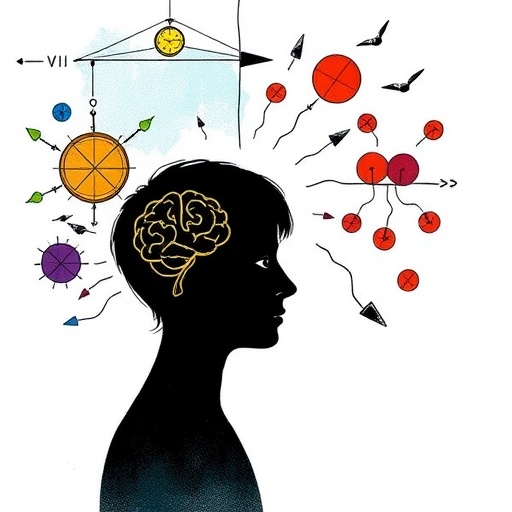In a groundbreaking study published in BMC Psychiatry in 2025, researchers have unveiled the intricate relationship between dominant depressive temperament (DDT), psychological resilience, and the severity of symptoms in obsessive-compulsive disorder (OCD). This investigation provides novel insights into how affective temperament profiles intersect with resilience mechanisms, shaping the clinical landscape of OCD beyond traditional symptom-focused paradigms.
The research centered on 129 individuals diagnosed with OCD, utilizing robust psychometric instruments such as the Yale-Brown Obsessive-Compulsive Scale (Y-BOCS) for assessing symptom severity, the Resilience Scale for Adults (RSA) to quantify various facets of psychological resilience, and the TEMPS-A questionnaire to categorize temperamental dominance. By integrating these tools, the study sought to delineate whether those exhibiting DDT manifest distinct patterns in resilience that correlate with their OCD symptomatology.
A critical aspect of the methodology involved stratifying patients based on depressive temperament using both validated cutoff scores and standardized z-scores derived from the depressive subscale of the TEMPS-A. Complementing this, participants’ depressive and anxiety symptoms were quantified through the Beck Depression Inventory (BDI) and Beck Anxiety Inventory (BAI), ensuring that mood state confounders were thoroughly characterized.
Results revealed that individuals with a dominant depressive temperament experienced markedly higher levels of depression and anxiety, in parallel to increased obsession severity as measured by the Y-BOCS. These findings underscore a phenotype of OCD that is intensely burdened not only by obsessive-compulsive pathology but also by affective dysregulation inherent in depressive temperament.
Interestingly, the resilience profiles of patients with DDT diverged significantly from those without this temperament. Subscales encompassing perception of future, structured style, social competence, family cohesion, and social resources were notably diminished in the DDT group, suggesting a pervasive erosion of psychological resilience dimensions critical for adaptive functioning. The exception was the perception of self, which remained comparatively unaltered, hinting at a complex modulation of self-concept in this subgroup.
Paradoxically, certain resilience components such as structured style—reflective of organizational skills and planning ability—were observed to be higher relative to other resilience metrics despite greater clinical severity. This phenomenon may point to compensatory cognitive strategies or rigidity in behavior often seen in OCD, especially when filtered through the lens of depressive temperament.
Delving deeper, partial correlation analyses, which controlled for confounding depressive symptoms, clarified that within the DDT subgroup, more intense obsessive-compulsive manifestations were tightly linked to weakened resilience resources, most notably family cohesion. This association eloquently highlights the potential role of interpersonal and environmental factors in modulating OCD severity within affective temperament contexts.
These nuanced findings challenge the reductionist view of OCD as a purely anxiety-driven disorder and spotlights the layered influence of temperament and resilience. The presence of DDT appears to amplify emotional vulnerability and degrade resilience capacities, thereby potentiating symptom severity. Such insights impart a critical dimension to psychiatric assessments, advocating for comprehensive evaluations encompassing temperament profiling and resilience metrics.
From a clinical perspective, this research advocates for tailored interventions that transcend symptom alleviation to address underlying affective vulnerabilities and fortify resilience. Therapeutic modalities aimed at enhancing family cohesion and bolstering social resources may offer substantive benefit for patients exhibiting DDT alongside OCD symptoms.
Moreover, the observed resilience deficits and the paradoxical strength in structured style within the DDT cohort offer intriguing avenues for cognitive-behavioral strategies that leverage preserved organizational skills to scaffold resilience-building programs. This approach aligns with contemporary personalized medicine paradigms seeking to harmonize treatment with individual temperament and psychosocial profiles.
Importantly, the study delineates the enduring relevance of temperament-resilience interplay in OCD independent of depressive symptomatology, reinforcing the notion that emotional and cognitive substrates interplay dynamically rather than in isolation. Such paradigms enrich our understanding of OCD pathophysiology, suggesting new biomarkers and treatment targets that integrate emotional regulation, temperament, and resilience constructs.
This research marks a significant stride towards a more holistic appreciation of OCD’s complexity. By elucidating how dominant depressive temperament and resilience interweave to influence disorder trajectory, it sets the stage for future longitudinal and interventional studies designed to harness these insights for improved patient outcomes.
As mental health fields evolve with increasing emphasis on biopsychosocial models, such integrative analyses underline the necessity of precision psychometrics and personalized intervention designs. The implications extend beyond OCD, offering a scaffold for examining affective temperament and resilience across a spectrum of psychiatric disorders.
In sum, the intricate tapestry unveiled by this study impresses upon clinicians and researchers alike the imperative to recognize and therapeutically address the nuanced temperament-based variations in OCD. Efforts to enhance psychological resilience, especially in vulnerable temperamental profiles, promise a valuable frontier in mitigating the burden of obsessive-compulsive disorder.
Subject of Research: The interplay between dominant depressive temperament, psychological resilience, and symptom severity in obsessive-compulsive disorder.
Article Title: Dominant depressive temperament and psychological resilience in obsessive-compulsive disorder.
Article References:
Demirkan, A.K., Aydin Sunbul, E., Cengiz Cavusoglu, E. et al. Dominant depressive temperament and psychological resilience in obsessive-compulsive disorder. BMC Psychiatry (2025). https://doi.org/10.1186/s12888-025-07618-1
Image Credits: AI Generated




